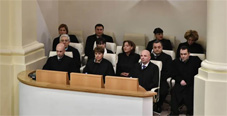
Parliament approves 14 Supreme Court Judges from the controversial list of candidates
By Nika Gamtsemlidze
Friday, December 13
The Parliament of Georgia has appointed 14 candidates to the Supreme Court for a lifetime. They were selected from a list of 20 people. The European Georgia, the United National Movement and the Alliance of Patriots of Georgia did not participate in the vote.
The topic has been a subject of controversy since the beginning. In parallel to the voting, protesters were gathered near the building of the Parliament of Georgia. During the Legal Issues Committee sitting, committee members recommended 14 out of 20 candidates to the parliament for further discussions, several people were detained near the Parliament.
At the committee, five candidates, Tamar Alania, Shota Getsadze, Paata Silagadze, Lasha Kochiashvili, and Gocha Jeiranashvili were voted down. Zaza Tavadze, the 6th candidate, refused to run for the position of Supreme Court judge and withdrew his candidacy.
The sitting of the Legal Issues Committee was held amid the heated debates. Independent MP Eka Beselia demanded the postponement of the session as, according to her, the process was not held in compliance with the Rules of Procedure.
After the legal committee, parliament also discussed the issue at yesterday’s Plenary Session, where the ruling party voted in favor of all 14 recommended candidates.
As the Parliament made the decision, member of the legal issues committee, Eka Beselia announced that she would be leaving the committee.
“This is a step backward, to the detriment of democracy, a step to the past, a step to injustice, a decision to resuscitate and legalize a violent system. This is a political but even greater moral failure of the Georgian Dream,” noted Beselia.
14 approved permanent judges are: Merab Gabinashvili, Miranda Eremadze, Mamuka Vasadze, Maia Vachadze, Tamar Zambakhidze, Shavla Tadumadze, Vladimer Kakabadze, Levan Mikaberidze, Giorgi Mikautadze, Nugzar Skhirtladze, Lali Papiashvili, Nino Kadagidze, Ketevan Tsintsadze and Sulkhan Tsintsadze.
During the last few months, different organizations have reported about the dangers behind these processes.
During the hearings at the parliament, the representatives of the European Georgia were saying that only one candidate fulfilled their criteria, and it was Tamar Zambakhidze.
Shalva Tadumadze had one of the most controversial hearings. The NGO Transparency International Georgia researched the biography of the General Prosecutor and found that although Tadumadze’s diploma says he enrolled in the institute in 1993. The institute was established in 1994.
In his biography, Tadumadze states that he graduated from university in 1999, while his diploma indicates that 1998 is the last year of his studies.
In addition, the General Prosecutor graduated from high school in May 1994, so it is not clear how he managed to enroll in the university in 1993.
Recent constitutional amendments and changes to the organic law of Georgia on common courts, the minimum number of judges at the Supreme Court increased from 16 to 28, at the same time, 10-year appointments were changed to lifetime tenures. The High Council of Justice (HCJ) was given the authority to nominate candidates for parliamentary appointment.
To disrupt the voting process, a few minutes before the voting, an unknown substance was spilled in the plenary room. For this reason, the lawmakers left the session hall and the voting was postponed for several hours. The investigation was launched by the Ministry of Internal Affairs under Article 117 of the Criminal Code of Georgia. Under this article, intentional serious harm to health is punishable by at least three years of imprisonment.
One of the Georgian Dream lawmakers described the attack as a terrorist act, while others described it as a chemical attack. Public Movement ‘It’s a Shame’ took responsibility for the incident.



